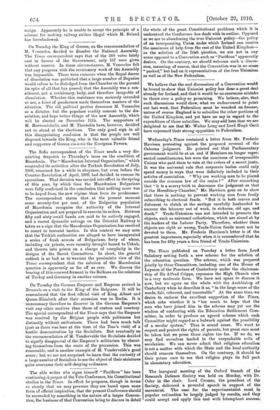The Sofia correspondent of the Times sends a very dis-
quieting despatch to Thursday's issue on the condition of Macedonia. The "Macedonian Internal Organisation," which suspended its activities after the Turkish Revolution of July, 1908, remained for a while in abeyance, but even before the Counter-Revolution of April, 1909, had decided to resume its operations. That decision was carried into effect in the spring of this year, by which time the Macedonian Bulgarians were fully confirmed in the conclusion that nothing more was to be hoped from the new regime than from its predecessor. The correspondent states that at the present moment some seventy-five per cent, of the Bulgarian population of Macedonia recognise the authority of the Internal Organisation and are prepared to execute its orders. Between fifty and sixty small bands are said to be actively engaged, and a recent dynamite outrage on the Oriental Railway is taken as a sign that the Macedonian Organisation has resolved to resort to terrorist tactics. In this context we may note that the Turkish authorities are alleged to have inaugurated a series of fresh arrests of Bulgarians, forty of whom, including six priests, were recently brought bound to 1Jskub, and thrown into prison on a charge of complicity in the designs of the Secret Committees. In short, the general outlook is so bad as to warrant the pessimistic view of the Times correspondent that the solution of the Macedonian question is apparently as far off as ever. We discuss the bearing of this renewed ferment in the Balkans on the relations of Turkey and Germany in another column.














































 Previous page
Previous page